Airds resident, wheelchair user Shereena Townsend reveals battles with social housing
Wheelchair user and mum of a two-year-old son, Shereena Townsend calls a social housing property in Airds home. But the reality is, the house is not fit for someone with her disability and her story is not uncommon.
NSW
Don't miss out on the headlines from NSW. Followed categories will be added to My News.
A wheelchair user and mum of a two-year-old son has been locked in a battle with social housing to ensure the house she calls home is fit for someone with a disability.
Shereena Townsend, 28, was born with osteogenesis imperfecta type 3/4, also known as brittle bone disease, which results in fractures and broken bones.
Due to this condition, Ms Townsend is three feet tall and a wheelchair user, and when she was born her mum was told she would “never have a normal life”. But, she has not let her disability stop her from chasing after her dreams.
“I am a full-time worker as well as my husband, and we both work in the community sector and love giving back to the community,” she said.
“We are happily married, and I gave birth to my miracle baby, as we did not know how my body would cope with the pregnancy, and he is now two years old.


“I view myself as a strong independent woman with the right to live an independent life, but the Department of Housing does not seem to see it this way.”
Ms Townsend was given access to a social housing home at Airds two years ago but it was not fit for someone with her condition and she had been locked in a battle with Department of Communities and Justice to fix the issue for more than 12 months.
“Because of the lack of modifications, I have had numerous shoulder dislocations and have now fractured my leg, and the department is still not taking my circumstances seriously,” she said.
“The property has no wheelchair access out the front, and my only entrance and exit at the back is a very steep ramp with uneven concrete slabs making it impossible to push my son‘s pram up and down independently and access my car safely.
“I have no access to my kitchen to cook independently and rely on a self-installed miniature table with a quick mini portable plate to cook. I cannot access the clothesline, making it impossible to put clothes out independently.”
Ms Townsend said she had fallen out of her wheelchair while she used the ramp, which resulted in a fracture, and she could need surgery.
She said she had tried to work with the Department of Housing to be put in a suitable home, but she was getting nowhere.
Ms Townsend said there needed to be more homes specifically designed for people with disabilities, and it should be easier to modify homes if required.

Housing Minister Rose Jackson said everyone deserved a safe and affordable place to call home and to live with dignity and independence.
“It just isn’t good enough to have someone not be able to access core necessities of a home, such as their kitchen or safe access off the property.
“We are working towards rectifying this issue as a matter of priority and will monitor the status closely. I agree our core goal of our social housing system should be to support people to live independently.”

After this publication reached out, the Department of Communities and Justice escalated this issue and booked an occupational therapist on Wednesday to expedite the process of specific modifications to address Ms Townsend’s needs. She has also been placed on the priority transfer list.
“Some minor modifications had already been undertaken prior to Ms Townsend moving into the property, but we want to ensure that people are living in homes that are fit for purpose and address their personal needs,” Ms Jackson said.
Red tape to access help
Ms Townsend said while she could access funding from the National Disability Insurance Agency, they could not assist her with modifications as it was a social housing property.
If she was the owner, however, she would be able to receive support.
“If a participant requires modifications to their community or public housing, they should first contact their state or territory public housing authority,” an NDIA spokesman said.
“Providers of social housing, residential facilities and public buildings are responsible for making reasonable adjustments to the property.
“The NDIS was not designed to replace state and territory responsibility. Accessible and affordable public accommodation remains the responsibility of the state and territory governments.”
The office for Bill Shorten, the Minister for the National Disability Insurance Scheme, was contacted for comment.
Lives on hold with long waits for social housing
In NSW, in June 2022, 57,550 were on the waiting list for social housing, with 51,031 on the general waiting list and 6519 on the priority list, and the NSW Government website indicates people on the general waiting list can expect to wait 10 years or more in most locations.
Alan Morris, a professor at the Institute of Public Policy and Governance at the University of Technology Sydney, was part of a research project and interviewed more than 70 people waiting for social housing in NSW, Queensland and Tasmania.
He said half of the people interviewed either lived with a disability or were caring for someone with one.
“If you are on the general list, the reality is that you could be waiting forever,” Professor Morris explained.
“To get even onto the general list, you have to be very vulnerable, and these people are often living in poor conditions using more than 70 per cent of their funds on private rentals.
“To get onto the priority list, you must be basically homeless.”
Professor Morris said more purpose-built social housing for people with disabilities was urgently needed.
“Access to affordable, secure housing and appropriate housing really should be a human right,” he said.
“Not being able to access affordable and secure housing does accentuate their disability, and their capacity to live a decent life is severely undermined.”
More Coverage
Originally published as Airds resident, wheelchair user Shereena Townsend reveals battles with social housing




